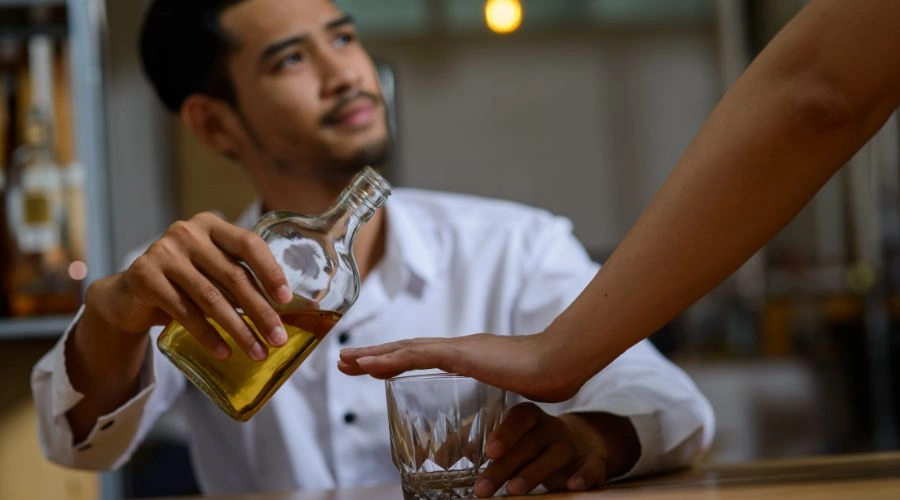Denial, Minimizing, and Excuses Given Not to Get Needed Help
There are 12 patterns of denial in substance abuse that come up over and over again. Dealing with substance abuse issues is an extremely challenging situation to face in life.
Since this is such a tough reality to face, many individuals wind up denying the severity of the problem or try to avoid the subject altogether. We would like to highlight those below to help you understand what to look for in yourself or a loved one.
#1 – Absolute Denial of an Addiction
For some people, it will be the complete denial of the existence of an addiction that makes it difficult for others to provide help. You may find yourself in this position of self-deception. You may refuse to acknowledge to others that you are suffering from alcohol or other drugs and need the help of a qualified professional to turn things around.
It is quite common for people to be in denial about their addiction. If the addicted individual is a loved one, you might find yourself feeling frustrated that you can’t break through and have an honest and open conversation about your concerns surrounding the situation. Drug abuse and alcohol abuse can take a powerful hold over a person and make it difficult for anyone else to get in and be heard.
Get Effective Detox and Rehab Options
Find Help At Ingrained Recovery
#2 – Minimizing the Severity of the Problem
In some cases, the affected individual will acknowledge that there is a substance use problem to address. However, they will minimize how significant their symptoms are or what role the addiction is playing in their life. If you have found yourself explaining away your drug use or alcohol use to friends and family while downplaying its severity, you may be falling into this pattern. Most of the time, the problem is far more significant than you want to admit, and it is already having a powerfully negative impact on your life as a whole.
#3 – Rationalizing Substance Abuse

You might find yourself providing reasons to others for your substance use – making excuses, in other words. This is known as rationalizing. While it might feel realistic and even honest at the moment, it is always hiding something more serious below the surface.
Some of the things you or a loved one might be saying as a way of rationalizing include “I drink at work because I have a stressful job and my colleagues drink too. I actually drink less than they do!”, or “I use drugs occasionally just to take the edge off.” This is addiction denial. The longer you go making excuses for why an active addiction isn’t a problem, the harder it will become over time to get on a path toward recovery.
#4 – Blaming Others for Substance Use Disorder
Some cases of substance use lead the addicted individual to blame the behaviors or problems of others for their own drug or alcohol addiction. In this way, the negative consequences that come along with addiction can be projected onto others, whether it is family members, spouses, bosses, or others.
This type of denial in addiction can be quite harmful. It prevents the individual from taking ownership of the addiction and working to change the situation. Accountability is critical in recovery, but accountability can’t exist until the blame of others stops and you or a loved one owns the addictive behaviours and takes steps to get help.
#5 – Comparing Substance Abuse to Other People
Another form of denial in addiction is comparing drug or alcohol use to other people. This is a slippery slope because there is likely always someone who can be used as an example of having a “worse” problem with addiction. Of course, just because someone else is struggling with drugs or alcohol doesn’t mean that you don’t need help – it just means that the other person likely needs to get help, as well.
For example, if someone you know has ended up in legal trouble as a result of an addiction – such as by getting a DUI – you might minimize your own substance abuse since you have stayed away from an arrest. However, simply staying out of legal trouble doesn’t mean your substance use has not had negative consequences. It is likely that the people around you can see the many different ways that drugs or alcohol have been harmful in your life.
#6 – Claiming to Have Control Over the Situation
It’s common for people with a substance use issue to claim – or even to truly believe – that they can stop whenever they want to. This might be another story that you have told yourself or others along the way. You might have said something like “Yes, I’m drinking a lot, but it’s not a problem because I can stop at any time.”
Most likely, the reality of this self-assessment is that you really wouldn’t be able to stop so easily. In fact, the actual consequences and symptoms of your drinking (or drug use) are far more significant than you are letting yourself believe. In many cases, it’s only when the individual actually attempts to stop using drugs or alcohol that they realize just how powerful their influence is and how much effort – and help – it will take to break it.
#7 – Deflecting Attention Away from the Addiction

Changing the subject is a classic denial technique that deflects the attention away from the individual in question and onto something else. For example, if someone in your family asks about your substance use, you might turn it around on them and point to things that they are doing wrong. Or, you might simply say “There are bigger problems in the world than my drinking.”
This might be the truth, but it doesn’t change the reality of the situation. This is simply a way to avoid difficult conversations and the reality of how serious the addiction may be. Unfortunately, it is not an effective strategy for dealing with the addiction.
#8 – Manipulating the Rehab Process
Sometimes, an individual may actually agree to enter rehab as a way to appease those around them. However, they won’t truly engage in the rehab process and take it seriously enough to make meaningful progress. This is a different type of addiction denial, but it has the same result – a continuation of the addiction and a lack of improvement for the underlying issues that are leading to addiction in the first place.
If you have a loved one in this situation, they might be skipping some of their therapy sessions, or not taking those sessions seriously when they do attend. They still cannot accept their addiction at this point, even if they are technically in rehab, and it’s unlikely that any lasting recovery will be achieved. As a result, this treatment will not be as helpful as it could be.
Get Accredited Treatment at Ingrained
Find Help At Ingrained Recovery
#9 – Hopelessness Related to Alcohol or Drug Addiction
This type of addiction denial goes in a different direction than the points we have been talking about so far on this page. Rather than refusing to admit the existence of a substance use problem, the individual, in this case, knows that they have a problem – but they no longer believe that it’s possible to overcome the addiction and create a sober future.
You might find yourself saying things like “I’ll never be able to quit”, or “Rehab won’t work for me”. In this case, the mental health issues that underly the addiction have become so significant that they don’t allow you to see any other path forward. Of course, the future is not as dim as it might seem in the midst of an addiction. Through emotional support and the professional help of a licensed rehab facility, recovery is absolutely possible.
#10 – Justifying the Use of Addictive Drugs or Alcohol
Attempting to justify the use of drugs or alcohol is another popular way to deny the significance of an addiction. In this case, there is a reason you may be presenting to others to explain why you are using a particular substance. It could be that you state your anxiety requires you to use a substance, or that you simply can’t function without it.
Upon closer inspection, these excuses are problematic, and actually highlighting the seriousness of the underlying issue. If you truly need to use a substance to deal with overwhelming anxiety or to even function in life, there are other issues at play that need to be addressed in a healthy, productive manner.
#11 – “I’m Not Hurting Anyone But Myself”

It’s common for addicts to believe that their addiction is only harming themselves. For example, someone with an alcohol abuse problem who doesn’t drive when they drink could claim that the alcoholism is their problem alone and therefore doesn’t need to be resolved.
This is almost never the case, however. Substance use disorder hurts everyone around you, including worried family and friends, job performance, and beyond.
While bleeding in stool from alcohol, or an overdose from opioids, are obvious red flags that you are causing damage to your life, there are countless smaller signs and pieces of ‘shrapnel’ that can impact your loved ones and friends.
And in many cases, those in active addiction deny and deflect around just how much damage our alcohol and substance misuse causes those we care about.
#12 – Avoiding the Topic of Substance Abuse Entirely
Finally, we see that some people just flat out won’t talk about their substance use and will immediately shut down any discussion about going to rehab. This type of stonewalling is a defense mechanism to being confronted. It blocks the outside world from getting to the heart of what is going on and what can be done to start the healing process.
Up To 100% of Rehab Covered By Insurance
Find Help At Ingrained Recovery
Overcome the 12 Patterns of Denial in Substance Abuse Today
There is no limit to how long you or a loved one could continue to use these 12 patterns of denial in substance abuse to resist getting treatment for alcohol or drug use. Make today the day that it stops. Substance use disorder isn’t something that will resolve itself easily, or by accident – it is going to take a focused, concerted effort to end your drug and alcohol use and turn over a new leaf in life. The team here at Ingrained Recovery is ready to help with the process of overcoming denial.
We can start you on the recovery process through services like medical detox, residential treatment programs, and much more. Don’t let your addiction cause any more problems in life without reaching out for help. Speak with our admissions team today to talk about your addiction treatment options and the stages of care. We can provide the intervention tools and professional help needed to make a lasting change.

